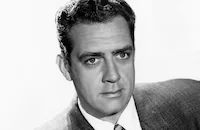Serpent of the Nile

Brief Synopsis
Cast & Crew
William Castle
Rhonda Fleming
William Lundigan
Raymond Burr
Jean Byron
Michael Ansara
Film Details
Technical Specs

Synopsis
In Rome in 44 B.C. after the assassination of Julius Caesar, the armies of the enemies of Caesar, Brutus and Cassius clash with those of Marc Antony and Octavius, who remain loyal to Rome. Captain Lucilius of Cassius' army discovers that in his despair over the faltering battle, Cassius has committed suicide, and reports the news to his friend Brutus. Lucilius offers to take Brutus' place when the conquering armies arrive, and Brutus, touched by his loyalty, agrees. When Lucilius is brought before Marc Antony, however, Antony recognizes him and, hoping to convince him to switch his allegiance, observes that should Brutus rule, he will never return Rome to the people. Lucilius is spared a decision when news comes that Brutus has also committed suicide. Dismayed, Lucilius laments that there are no further battles to be fought for the honor of Rome, but Antony challenges him to join the fight against the encroaching power of Queen Cleopatra of Egypt, widow of Caesar, who is rumored to have supported Brutus' uprising. Impressed by Antony's spirit, Lucilius agrees, and soon after in Tarsus, the two men witness the arrival of Cleopatra's navy. With much ceremony, Antony and Lucilius are received aboard the queen's barge, which boasts a grand display of the wealth of Egypt. Cleopatra uses this and her personal charms to entice Antony into an alliance, against the advice of Lucilius. Hoping to appease Lucilius, Cleopatra vows that no harm will ever come to Antony through his association with her. When Lucilius questions Cleopatra's role in Brutus' rebellion, he learns that the support came from Cleopatra's sister, Arsino. Despite the queen's attempt to rekindle the relationship she had with Lucilius during their days with Caesar, Lucilius remains distrustful, yet loyally stays with Antony when he departs with his army to Alexandria. Upon arriving in the Egyptian palace, Cleopatra presents Antony and Lucilius to court, and Antony is struck in the arm by an assassin's arrow. Lucilius tracks down the assassin, who explains that Cleopatra was the intended target as she is much hated for robbing her people of their wealth and leaving them starving. After the assassin is killed by the queen's guard, Lucilius says nothing about the information to Antony. Cleopatra treats Antony to the pleasures of Egypt, which Lucilius watches with silent trepidation. Privately he reveals to Cleopatra that he knows the truth behind her great wealth and scorns her romantic overtures. Incensed, Cleopatra sends two assassins after Lucilius, but the captain overpowers them. Despite this, Antony refuses to believe Lucilius' revelation about Cleopatra's duplicity. Cleopatra insists Arsino be held responsible for the enmity between Rome and Egypt and demands her death. Lucilius refuses to partake in murder and convinces Antony to bring Arsino and her counselor, Serapian, to Alexandria. Antony and Cleopatra agree, but in secret Cleopatra assigns the captain of her army, Florus, to escort Lucilius to the desert to kill her sister and the counselor. In the desert Arsino and Serapian learn of the approach of Cleopatra's army and flee, but are soon captured. As Lucilius attempts to question Arsino, Florus' men strike, killing her and Serapian. Lucilius is returned to Alexandria under guard, and Cleopatra and Antony learn that he intended to free Arsino. Antony remains dubious, but orders Lucilius held in his room for the next few months. Plagued with guilt about his now slavish devotion to Cleopatra and his betrayal of Lucilius, Antony falls into despair and constant drunkenness. Finally, on the evening of a great feast he has ordered, Antony stumbles away to present Lucilius with a jug of wine, which he then drugs with a sleeping draught so that his friend might knock out his guards. Later after the guards have drunk the wine and passed out, Lucilius escapes and after battling and killing Florus, finds Antony and declares he will return to Rome and Octavius. Antony agrees, despondent over his inability to give up Cleopatra. Lucilius returns to Rome and the Senate soon declares war on Egypt. The legions of Octavius attack those of Cleopatra and Antony, and after much bloody carnage, the palace in Alexandria is surrounded. Knowing that all is lost, Antony contemplates suicide as Cleopatra, equally distraught by the failure of the war, considers the same, even as she wonders if she might still win Lucilius. Outside the palace, Lucilius asks Octavius if he might see Antony before his arrest and finds his friend dying of a self-inflicted wound. Antony demands to see Cleopatra and declares his love for her before dying. When Lucilius reminds Cleopatra of her vow that no harm would befall Antony, she remains stunned. After Lucilius stalks out, Cleopatra places a poisonous snake to her breast and dies.

Director

William Castle
Cast

Rhonda Fleming

William Lundigan

Raymond Burr
Jean Byron

Michael Ansara
Michael Fox
Conrad Wolfe
John Crawford
Jane Easton
Robert Griffin
Fredric Berest

Julie Newmeyer
Crew
Mischa Bakaleinikoff
Sidney Clifford
Francis Cugat
Jack Erickson
Henry Freulich
Charles S. Gould
Gene Havlick
Sam Katzman
Robert E. Kent
Herbert Leonard
Jean Louis
Paul Palmentola
Anatole Robbins
Willeta Smith
Josh Westmoreland

Film Details
Technical Specs

Quotes
Trivia
Used sets from Salome (1953).
Notes
The opening title card reads: "Columbia Pictures Corporation presents Serpent of the Nile The Loves of Cleopatra." The real Queen Cleopatra VII (69-30 B.C.) was the daughter of Ptolemy XII, who appointed her and his son Ptolemy VIII to rule Egypt jointly. When her brother forced her from the throne, she turned to Rome's Julius Caesar, and with his help, overthrew her brother. She married her younger brother, Ptolemy IX, and relinquished power to him, then lived in Rome with Caesar and bore him a son, Caesarion. She later murdered her brother/husband to clear the way to the throne for her son. Unlike the film, Cleopatra did not remain continually with Marc Antony, who deserted her at the battle with the Parthians, despite her bearing him twins. They reconciled after his triumph in Alexandria, but Cleopatra then abandoned Antony at the climactic battle of Actium, withdrawing her fleet and fleeing to Alexandria. Upon learning that Octavius intended to exhibit her in Rome, Cleopatra committed suicide, probably by poison; legend says she died from an asp bite.
Among the many film versions of the life of Cleopatra are Fox Films 1917 Cleopatra, starring Theda Bara, Fritz Leiber and Thurston Hall, directed by S. Gordon Edwards (see AFI Catalog of Feature Films; 1911-20); Paramount's release of the Cecil B. DeMille 1934 production of Cleopatra, starring Claudette Colbert, Warren Williams and Henry Wilcoxon (see AFI Catalog of Feature Films; 1931-40); and Twentieth Century-Fox's 1963 production, also entitled Cleopatra, starring Elizabeth Taylor and Richard Burton and directed by Joseph L. Mankiewicz (see AFI Catalog of Feature Films; 1961-70).












